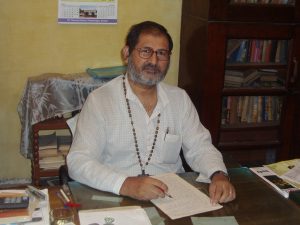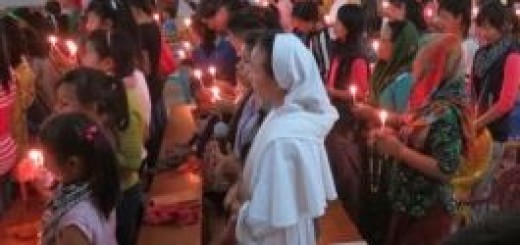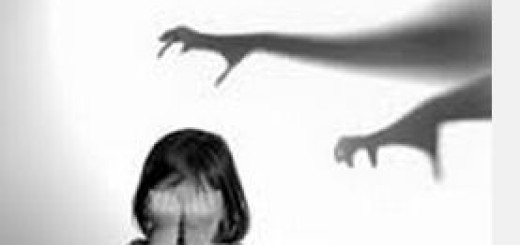HANG RELIGION, SPIRITUALITY IS THE BIG BANG! (Concluding part of the trilogy “Is Religion Dead?” and “Was Jesus Religious?”)

CHHOTEBHAI
My previous two articles were in response to questions being raised about religion in the wake of the Covid-19 pandemic.They have elicited varying responses. One school of thought still clings to the belief that Religion is now dead and we have ushered in a new dawn of closed churches and openness to Spirituality.Perhaps I still have something to contribute to this debate.
I would begin by defining what I understand by Religion, Religiosity and Spirituality. By Religion I mean an organised set of beliefs, practices and structure. By Religiosity I mean the merely external, and possibly superficial, following of certain religious practices, without fully comprehending their deeper import. By Spirituality I mean various expressions or attempts that are not bound by religious precepts or structures, though they may find inspiration from them. I must here iterate two things. Firstly, these are my own deft or daft definitions. Secondly, I do not believe that I have the right to judge anybody else’s thoughts and actions, though I reserve the right to analyse or question them.
In my previous two pieces, I have focussed on Religion. I will now turn to Spirituality. I have a great sense of inadequacy as I write, because there are really no yardsticks to describe or measure Spirituality. It could mean many things to many people. Hence I will limit my thoughts to my own experiences, and what I find in the person of Jesus himself.
I need to delve deep into my past, because today I am living what could be described as a “secular” life, far from the world of “spirituality”. I am contradicting myself when I simultaneously aver that living a secular life does not make one less spiritual. Only the expression or manifestation varies.My personal mantra now is “First seek the kingdom of God and its righteous and everything else will be added unto you” (Mat 36:33).
I have earlier said that Jesus was a religious person. I am now asserting that he was a deeply spiritual person. He was spiritual because he was constantly led by the Holy Spirit to do the will of his Father. So my definition of a spiritual person is one who, like Jesus, seeks to do the will of God in all things. For this the seeker should have the necessary tools of discerning God’s will, and the strength to do so. Ironically, the inspiration for both may come from religion. In the case of a Christian, I would see this inspiration coming primarily from the life and words of Jesus as found in sacred scripture. Its implementation would depend on how it affects what Jesus called the least of the brethren (cf Mat 25:31-46), or Gandhiji’s last man and VinobhaBhave’sAntyodaya.
Since there are no parameters to assess the spiritual journey, the Christian tradition has held that we need a mentor, a guide, a guru. It is so easy to go off on a tangent and end up in the wilderness. Going back to our geometry class, we know that a tangent moves away from a circle. At the point of departure, the difference will be imperceptible, but with the passage of time, the distance will grow, as with a spacecraft leaving its elliptical orbit. It then gets lost in outer space. I find that there is often a very fine dividing line between truth and error. It is not easy to discern. Spiritual discernment is something that I learnt from the Jesuits, or more specifically the Spiritual Exercises of St. Ignatius of Loyola, the founder of the Jesuits.
As a lay man, I had made many solitary retreats during the 7 years that I lived in Jyotiniketan Ashram, Bareilly (1975-1982) with Fr. Augustine Deenabandhu OFM Cap as my spiritual mentor. During those years I experienced “the glorious liberty of the children of God” (cf Rom 8:21). My defining moments were the two Ignatian Retreats that I made; the full 30 day one under Fr. Dan Rice SJ in Punarjanamsthan, Bihar, and a 20 day one under Fr. Josef Neuner SJ in De Nobili College, Pune. Both these retreats helped me to discern the will of God in my life. I also had the venerable life of Fr. Deenabandhu before me, to guide me. After I got married in 1984, I had a new mentor, my wife Meera. Some may consider this ridiculous, but it is true. For example, in 1990 when George Menezes, the erstwhile National President of the All India Catholic Union asked me to be his successor in office. I expressly said to him, “First get my wife’s permission”.
Spirituality is like unchartered waters. Hence we must have a mentor, even if at times it may seem like a tormentor to one’s soul. Even the Pope has to have a mentor in the form of a Confessor. Though Pope Francis himself is a Jesuit, he has a Capuchin like Fr. Deenabandhu as his Confessor. It is here that I defer from what is often described as Indian Spirituality. Based on the ashram model of Guru-Shishya, the Guru becomes a know-all. It is for this reason Jesus forewarned us that nobody should be called Master or seek the high places (cf Mat 23:8-12). Omniscient and Omnipotent gurus could be potentially dangerous.
For Jesus himself, Joseph the carpenter, and Mary who pondered many things in her heart (cf Lk 2:19) would have been his mentors (cf Lk 2:51). Yet he required confirmation or affirmation of what he was to embark upon. He therefore had many manifestations (epiphanies) in his life. His first epiphany was at the age of 12, when he began to comprehend who his Father was (cf Lk 2:49). His second epiphany was his baptism by John (cf Lk 3:21-22) immediately followed by his excruciating desert experience (cf Lk 4:1-13). The next epiphany is the Transfiguration, again affirming that he was indeed the Son (cf Mat 17:2). His final 2 epiphanies are seldom described as such. His penultimate was the raising of Lazarus shortly before his own death and resurrection (cf Jn 11:38). He needed that reassurance that his death would not be in vain. His ultimate epiphany is the internal conflict in Gethsemane where he pleads with the Father to allow this cup to pass over him (cf Mat 26:39). Yet after prayer he was able to say “Your will be done” (cf Mat 26:40) and later to say “It is accomplished. Into your hands I commend my spirit” (cf Jn 19:30, Lk 23:46).
Now all this sounds very well in the case of Jesus. How about weak mortals like us? How can we discern the will of God and then accomplish it? There are no easy answers. As I said, Spirituality is like unchartered waters, a Cloud of Unknowing, based on the Uncertainty Principle. It is for this reason that the vast majority of believers prefer not to take any risk, and simply follow the rules. So if I go to church on Sundays, attend some novenas or say the Rosary, and do some acts of charity, I feel that I am a good person. I have followed the rulebook.
But for a spiritual seeker, who wishes to be a disciple of Jesus, this is not good enough. I see three encounters with Jesus where good people are told that what they are doing is not good enough. The first is of the rich young man who had kept all the commandments (cf Mat 19:16-22). The second was to Martha who was doing a good job and yet was asked to take another step (cf Lk 10:42). And the third was Nicodemous who was asked to be born again (cf Jn 3:3).
The spiritual life is like walking a tight rope, a delicate balancing act. One has to be always alert to the gentle tugs and pushes that come one’s way. We call them promptings of the Holy Spirit. I will here share two insights from my Ignatian Retreat. Firstly, for the one who is ill prepared the coming of the Holy Spirit is like rain splattering loudly on a tin roof. This is what happened at the first Pentecost (cf Acts 2:2). For the soul that is disposed to his coming it is like a drop of water on a sponge, hardly noticeable on the surface and quickly absorbed. We see this with Mary at the Annunciation (cf Lk 1:38). It was no earth-shattering event!
The second lesson is that we are aware of our weaknesses and so guard against them. In the process we leave our strengths unguarded allowing the tempter to enter in; just like the havoc wreaked by Covid-19 today. It caught the strong, independent, wise world and its leaders completely off guard.
I am aware that much of what I have now written may be befuddling. I will be neither surprised nor disappointed. But I do believe that there are many out there who are restless spiritual seekers in their own ways. This piece is addressed to them, in the hope that it will help them in some way in their spiritual quest.
Before writing this piece, I harkened back to another spiritual master, St. Theresa of Avilla of the 16th century, and her spiritual classic “Interior Castle”. I immediately went to the Seventh Mansion that records her spiritual marriage or ultimate state of spiritual ecstasy. There are two important takeaways from this pinnacle of spirituality. She repeatedly talks of humility and the need for spiritual experiences to be translated into action. She debunks the popular concept that Mary chose the better part over her sister Martha.
I would conclude with another important tip for those embarking on a Spiritual odyssey. Have the good news of the Gospel in one hand and the newspaper in the other, so as to contextualise your spirituality. This is in fact the thrust of the Vatican II document “Pastoral Constitution of the Church in the Modern World” (Gaudium et Spes). This in turn draws inspiration from the “Dogmatic Constitution of the Church” (Lumen Gentium) that is in fact a paradigm shift from religiosity to spirituality.
The tragedy, as I will not tire of saying, is that the wished-for renewal of the Church according to the vision of Vatican II has been stifled by the “good people”; the hierarchy and the clergy that wallow in a status quoist comfort zone. It is these “good” people who are unable to take that extra step Jesus invites us to do, so as to be perfect as the Father is (cf Mat 5:48). Several years ago I read an editorial in the Jesuit theological magazine “Vidya Jyoti”. It unequivocally stated that the vision of Vatican II could only be realised through an enlightened laity.
So let us embark on the path of spiritual enlightenment and lead this world from darkness to light, midst the encircling gloom of Covid-19. Let us be beacons of hope to those who are most in need (not with a symbolic candle in hand). Let that be the real Spiritual Big Bang as we enter Holy Week.
*The writer believes in the secular spirituality of the world we live in.


















With my advancing age I am getting more and more scared of religion and spirituality. Now COVID-19 threatens to wipe away Christianity from the face of the world. Along with Chhotebhai quite a few brilliant writers in the CCV family seem to be bombarding ordinary readers like me with their wide range and grasp of varied subjects. Writing has always been a problem with me. I am hardly able to convince or persuade others by my writing. I get lost mid way. So I just pray to the Almighty to keep me on track reciting the Gayatri Mantra as often as possible. The English rendering (right or wrong) is:
O Supreme Creator, Thou art the giver of life, the remover of pain and sorrow and the bestower of happiness; O Creator of the Universe, may we receive Thy supreme sin-destroying light; may Thou guide our intellect in the right direction. O Great Lord of All Worlds, You are the sweet fragrance of life. You are the creator and sustainer. Free us from the terrible diseases of ignorance, attachment and weaknesses. Deliver us to freedom and ultimate liberation.
O Supreme Creator, You are the creator of the entire Universe. Take away all the bad deeds, bad habits and miseries. Give us all the good qualities, and blissful and auspicious objects. Oh Lord, radiance of a million suns, please make all my good works free of obstacles, always".
CCV, besides deepening and widening the knowledge also strive to strengthen the faith of your readers.